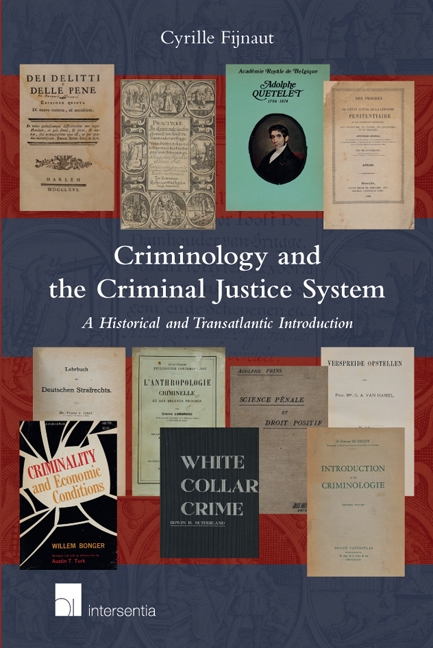Book contents
- Frontmatter
- Preface
- Contents
- Chapter 1 General Introduction
- Chapter 2 Origin of the Present-Day Criminal Justice System
- Chapter 3 Restructuring of the Criminal Justice System During the Enlightenment and the French Period
- Chapter 4 Emergence of the Scientific Study of Crime, Criminals, and the Combatting of Crime
- Chapter 5 Establishment of Criminology in Italy and France
- Chapter 6 Development of Criminology in German-Speaking Europe and the United Kingdom
- Chapter 7 Establishment of Criminology in the Netherlands and Belgium
- Chapter 8 Ideologisation of Criminology in the Third Reich and the Soviet Union
- Chapter 9 Reception of European Criminology in the United States
- Chapter 10 Transatlantic Integration of Criminology
- Chapter 11 General Conclusion
- Bibliography
- Register of Names
Chapter 4 - Emergence of the Scientific Study of Crime, Criminals, and the Combatting of Crime
Published online by Cambridge University Press: 11 October 2018
- Frontmatter
- Preface
- Contents
- Chapter 1 General Introduction
- Chapter 2 Origin of the Present-Day Criminal Justice System
- Chapter 3 Restructuring of the Criminal Justice System During the Enlightenment and the French Period
- Chapter 4 Emergence of the Scientific Study of Crime, Criminals, and the Combatting of Crime
- Chapter 5 Establishment of Criminology in Italy and France
- Chapter 6 Development of Criminology in German-Speaking Europe and the United Kingdom
- Chapter 7 Establishment of Criminology in the Netherlands and Belgium
- Chapter 8 Ideologisation of Criminology in the Third Reich and the Soviet Union
- Chapter 9 Reception of European Criminology in the United States
- Chapter 10 Transatlantic Integration of Criminology
- Chapter 11 General Conclusion
- Bibliography
- Register of Names
Summary
INTRODUCTION
It goes almost without saying that aft er the collapse of the Napoleonic empire, discussion arose throughout Western and Central Europe about its institutional legacy in the field of the criminal justice system and the combatting of crime. And given the history of that legacy, it is equally obvious that that discussion was permeated by all kinds of philosophical ideas, religious beliefs, and political theories. Ideas regarding crime and criminals naturally played an important role in this.
This chapter begins by considering the discussion of the prison system. In many countries, the comprehensive reorganisation of that system that gradually took place was more noticeable than the reform of the policing system. In some countries, that restructuring was certainly not unimportant but it was not the subject of public discussion and scholarly polemics to the same extent as reorganisation of the prison system. But that is no reason to ignore the reorganisation of the policing system; it was important from a social perspective and, in particular, it paved the way for an increasing role of the police in how criminals were perceived and in the fight against crime. Reform of the judicial system and of the codified criminal law were generally of less interest than the reorganisation of policing. Relatively speaking, they were to a considerable extent bones of contention within a small political, academic, and professional elite made up of jurists. In this abridged version of the book, they will be left aside.
The focus of the second part of this chapter is on the nascent scientific study of crime and criminals. The decision to deal with the various topics in this order is deliberate. The institutions that were gradually established made it possible to pursue this new science, for example by compiling statistics, but they also required scientific research in order to function in an acceptable manner.
Following on from these considerations, an account will be given of how a number of academic researchers in the mid-nineteenth century attempted to develop a clear picture of crime and its perpetrators. On the one hand, there was someone like Franz Gall who – in the wake of thinkers such as Lavater – adopted a more biological perspective on these issues, while on the other there were statisticians such as Adolphe Quetelet who introduced the sociological study of them.
- Type
- Chapter
- Information
- Criminology and the Criminal Justice SystemA Historical and Transatlantic Introduction, pp. 75 - 130Publisher: IntersentiaPrint publication year: 2017



